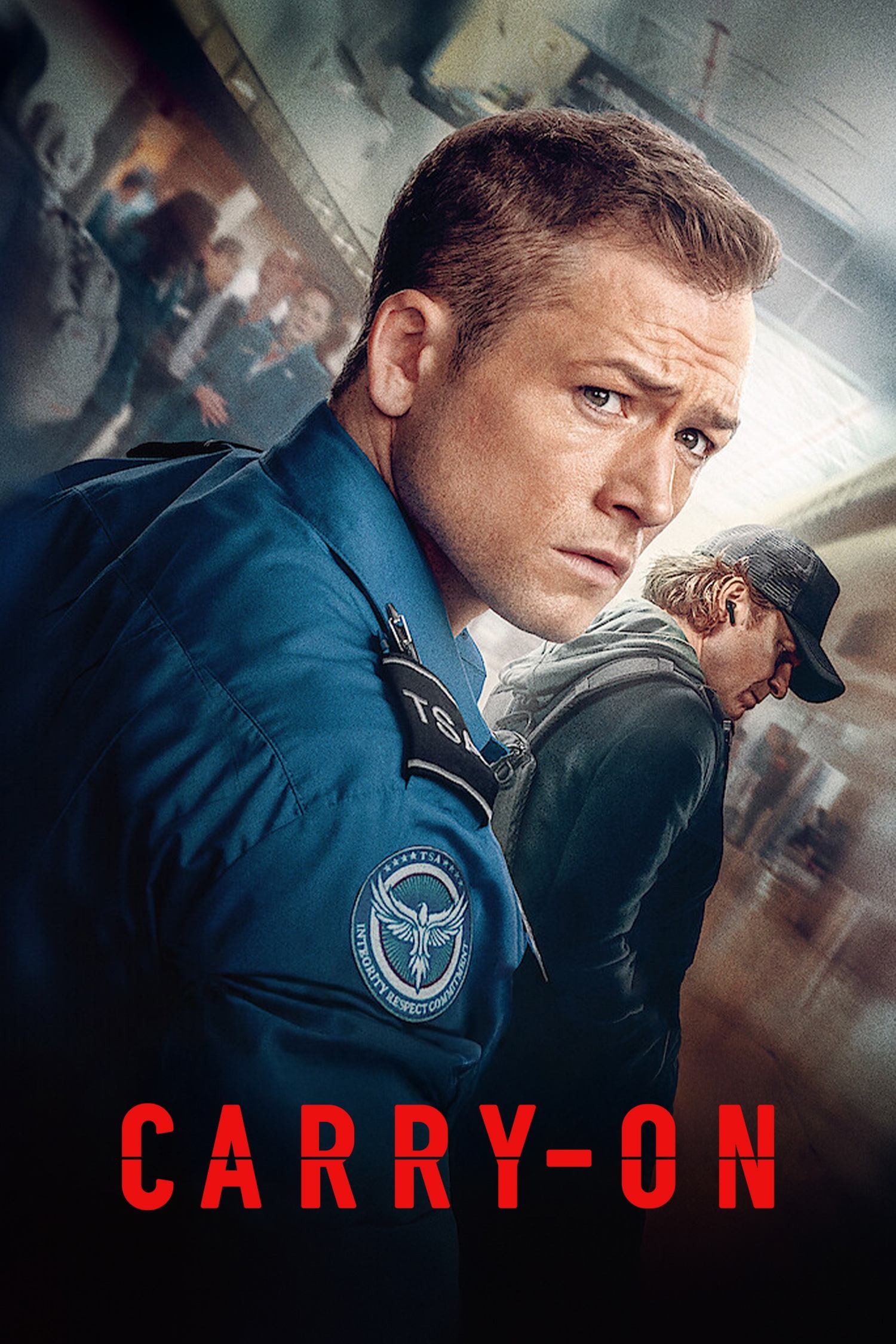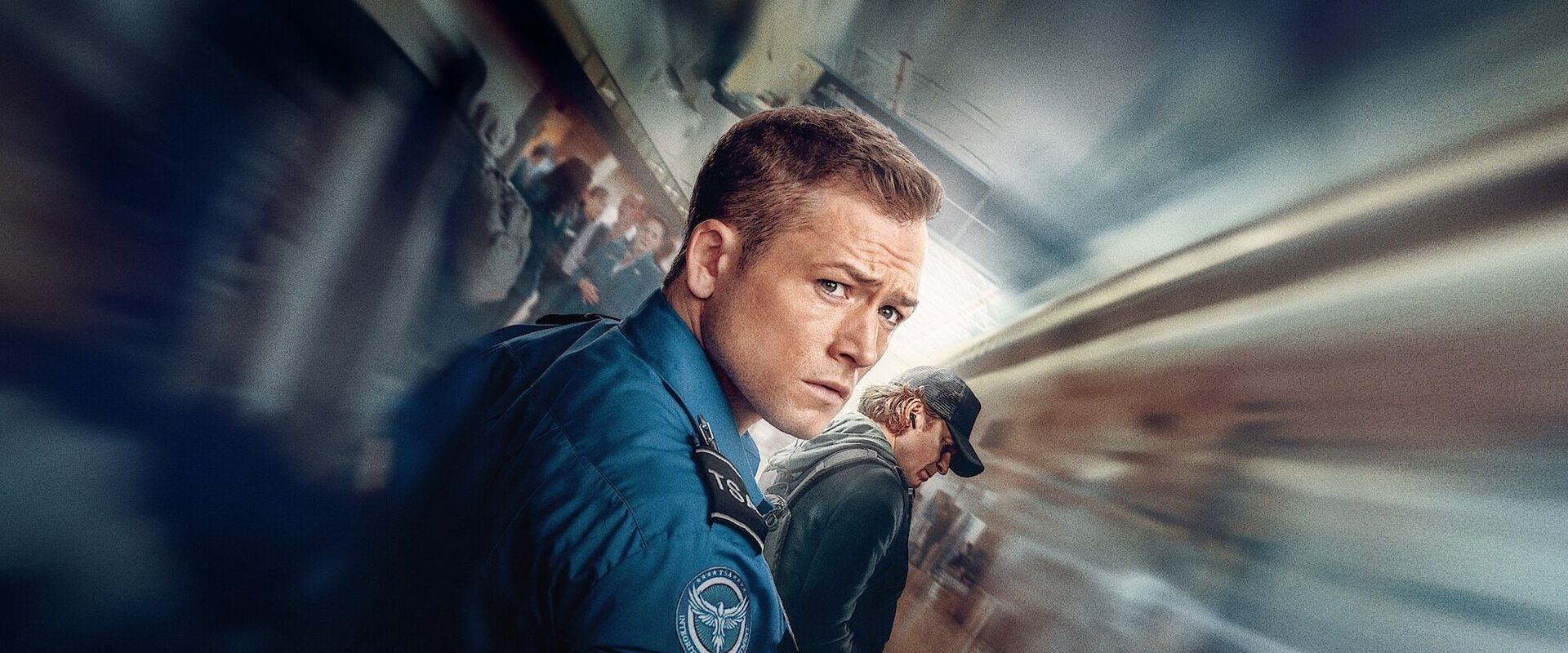You know the apocryphal story about critics who walk into an action movie wishing for a glimmer of difference—a splash of personality amid the prefab booms and glowering hostage negotiators? “Carry-On” waltzed onto my screen promising nothing new except a Christmastime setting and a Netflix logo, and about fifteen minutes in, I realized my cynicism had been mugged. Here is a film that doesn’t just meet the genre’s half-hearted handshake; it throws its arms around every cliché in the terminal, spins them twice, then has the nerve to wink.
The set-up is as old as airport security theater: Ethan Kopek, a TSA everyman with an overdraft in both self-esteem and ambition (Taron Egerton, who somehow manages to sweat relatability out of every pore), finds himself blackmailed on Christmas Eve by a villain who knows how to play the long game. The “Traveler,” played by Jason Bateman, is so slickly menacing you half-expect him to hand out signed headshots at baggage claim. His proposition? Let a suitcase of nerve agent through, or your loved one joins the Ghost of Christmas Future.
Sound familiar? The difference, and it’s the difference between being trapped in line at the DMV and cutting loose in the terminal lounge, is how sharply “Carry-On” twists the expected. Jaume Collet-Serra directs with the glib energy of a man who knows he’s stuck directing traffic but still wants to choreograph a ballet—cinematography full of muscular pushes and neon panic, yet never losing the thread of the human mess at its core. He finds, miraculously, that in the sickly glow of holiday lights, the chaos of modern travel is the perfect emotional tinderbox—fear, hope, and family all delayed at once.
Let’s talk Egerton. This is a performance with bruises. He’s not a superhero—he’s a man with his feet scrubbed raw by the airport floor, straining to plug one leak after another while the system, in trademark American fashion, deems his earnestness suspect. You feel his terror, his guilt, and—in what might be the film’s real surprise—his stubborn optimism, slouching its way toward redemption. In lesser hands, Ethan would be lucky to make it to credits without becoming background noise. Egerton gives him a pulse, ragged and persistent as a Christmas Eve heartburn.
And then Bateman—long Hollywood’s smirking straight man—finds a new frequency. He gives the Traveler all the silky confidence of a corporate warlock: there’s acid in his wit, ice in his threats. He’s so controlled you can practically see him doing mindfulness exercises between menacing phone calls. He and Egerton are paired for long stretches, and each scene is a skirmish—dialogue that crackles, quips that wound and bandage in the same beat. It’s rare when a movie villain feels like an actual adversary instead of a Boss Level, but Bateman is here to make you squirm.
As for the supporting cast—God save us from forgettable love interests and friendly cops. But Sofia Carson’s Nora, the no-nonsense pregnant partner, is written with enough vinegar you want to invite her to Christmas dinner just to see who she might bicker with. She’s both prize and participant, not just a body to be imperiled. Danielle Deadwyler’s detective isn’t wasted, either; there’s real heat between her and the rest of the ensemble, even as the film insists on hurtling through set pieces at warp speed. “Carry-On” has the decency to let its bit players bleed. Sometimes literally.
What about the script? T.J. Fixman has studied at the altar of fast-and-sharp. You get the sense “Carry-On” knows it’s standing in the shadow of “Die Hard” (the Yuletide Patron Saint of this whole subgenre), but it’s having a laugh before the bullets and nerve gas start to fly. The dialogue has teeth—banter that lands, painful confessions that don’t trip over sentimentality. Even when the film is going through its expected motions (the traitor, the last-ditch gambit, the inevitable face-off in the cargo hold), it’s busy decorating the clichés with a little sincerity and a lot of improvisational snap.
Collet-Serra’s touch shows best in how the movie juggles speed with clarity. The pacing’s brisk, but never mindless; the action is tight and comprehensible—a rarity in this age of motion-sickness editing. The airport itself matters—there’s thematic meat to all this security: the illusion of safety, the friction between public duty and private desperation. Even the madness of a Christmas Eve terminal is shot with lingering affection; you get both the claustrophobia and the sheer steely-eyed determination of people who just want to get home for the holidays. The visuals give the movie texture, a kind of scruffy sparkle. It’s not high art, but it’s never machine-tooled into meaninglessness.
Is it perfect? Of course not. Like all airport stories, it leaves with a little collateral: a few background characters caught in the crossfire, a finale that could stand to breathe instead of sprinting to the finish line. But the film remembers—if just for a beat—how chaos ripples outward, how real stakes outlast the news cycle.
Still, for all its nods to genre tradition, “Carry-On” is refreshingly uninterested in giving you only what you expect. It’s a Christmas thriller with heart, humor, and actual suspense: a movie that gallops apace with its own anxieties and still finds the courage to care about its people. I walked in braced for generic turbulence; I walked out with a goofy, lopsided grin. Sometimes, you need a holiday movie that just wants to entertain with enough conviction to almost—almost—matter.
If you’re tired of the parade of tinsel-strewn romance and you’d rather watch a TSA officer scramble through the existential X-ray of our times, “Carry-On” is the answer to a cinematic prayer you didn’t know you had. It’s brisk, smart, well-performed—a conspicuously good time that, for two hours, made me forget not only my own baggage, but why I started rolling my eyes at movies like this in the first place. Isn’t that why we showed up in the first place? Sometimes, yes, the carry-on is worth the trip.











